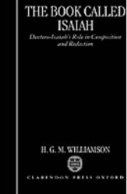
-
R 3,300.00
- EMAIL US
- OUT OF STOCK
- Download Catalogue

Recent research on the book of Isaiah has been dominated by discussions of its unity and authorship. Professor William's important new study provides a major and highly original contribution to these key issues, and is based upon a more rigorous methodology than used ever before. Isaiah is usually regarded as the work of two authors - the so-called Isaiah of Jerusalem (Isaiah 1-39) and Deutero-Isaiah (the author of Isaiah 40-55). Professor Williamson argues that the author of Isaiah 40-55 was in fact strongly influened by the work of the earlier writer. Secondly, he demonstrates that the earlier work was regarded as a book which had been sealed up until the time when judgement was past and the day of salvation had arrived, and that Deutero-Isaiah believed himself to be heralding the arrival of that day. Thirdly, and most provocatively, Professor Williamson argues that Deutero-Isaiah both included and edited a version of the earlier prophecies along with his own, intending from the start that they should be read together as a complete whole. This innovative and scholarly work, which sheds much new light on some of the more neglected passages in Isaiah, is certain to have significant implications for the future interpretation of this much-loved prophetic book.

The specification in this catalogue, including without limitation price, format, extent, number of illustrations, and month of publication, was as accurate as possible at the time the catalogue was compiled. Due to contractual restrictions, we reserve the right not to supply certain territories.